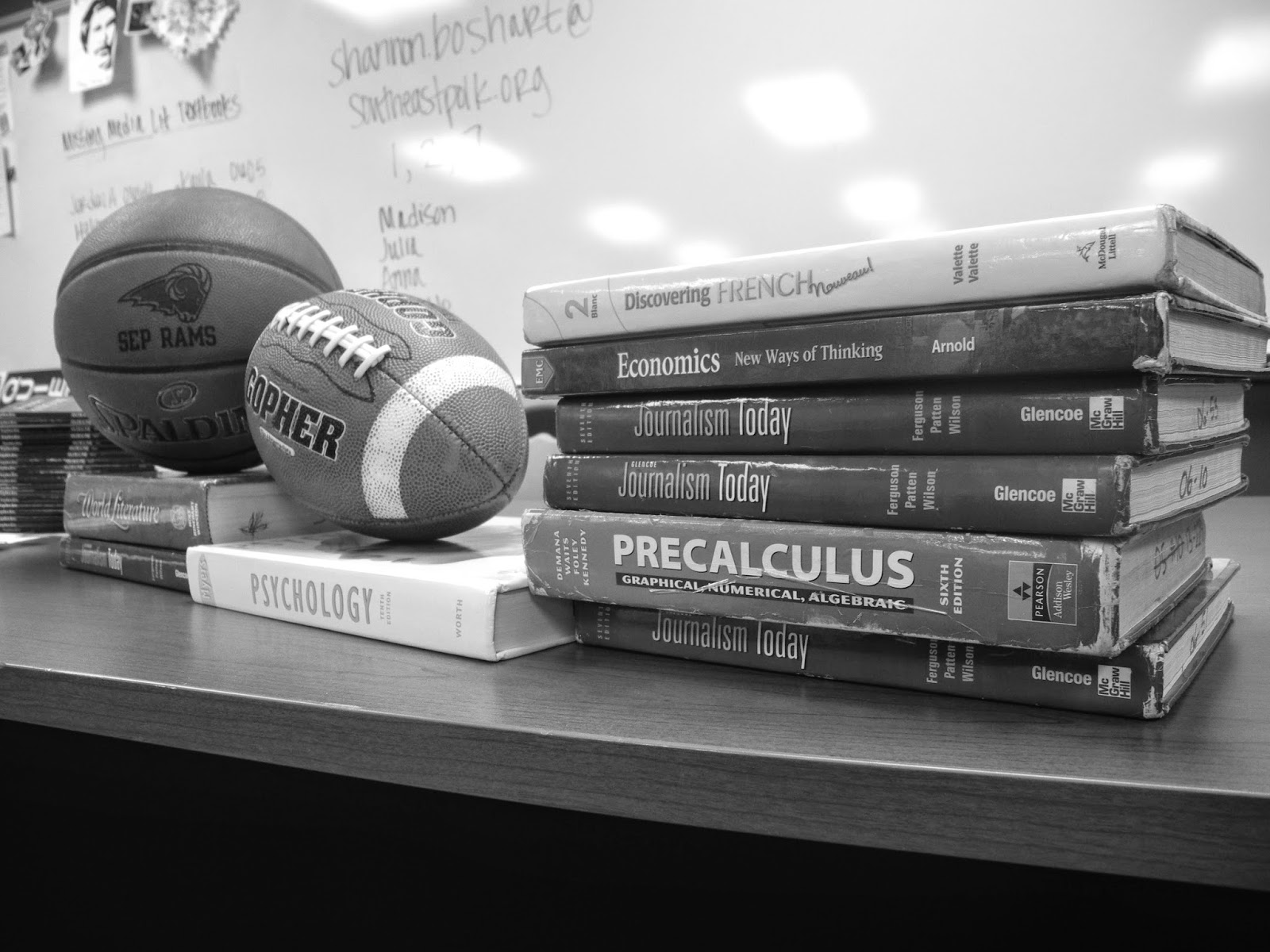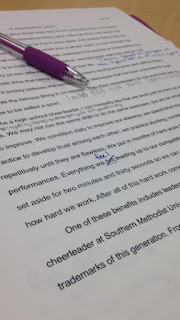Varsity Athletes Struggle to Balance Academics and Activities
Brett Blakemore
Sports Editor
The battle of being a student athlete, while known to many, is also an incredible challenge to balance. School itself, keeping grades up, and ultimately graduating is a feat enough for some students. Throwing in daily practices, weekends not being home, and having virtually no time for school work cannot be easy.
Senior hockey player Tyler Kruse knows this all too well. Playing for the Iowa Wild AAA U18 team, it is a rarity to be home for more than five days at a time. He plays tournaments frequently in cities all over the country, including Ann Arbor, MI, Boston, MA, and most recently Denver, CO.
“Most of the bus trips are five to six hours,” Kruse said. “We have done one ten hour and one 12 hour trip as well.”
Another athlete that has been in the thick of a busy schedule is junior basketball player Abby Penquite. While now she is playing for the varsity basketball team here, in the offseason she plays for an AAU team ‘The Attack’ that travels frequently. Similar to Kruse, free-time and school-time become a premium for athletes like these.
“We used to travel around the entire United States,” Penquite said. “The entire weekend I would be in a different state and then I would go back to school on Monday.”
While they can bring homework on the trips, there truly isn’t time to do it while at these events. Performing well and rest become the focus of an entire weekend, and school can be lost in the process, but when the pressure is on to perform there really isn’t the time for it.
“You would pack your bags and get on the bus. You get there the night before you play and you go out for a team meal. Friday and Saturday are pretty much the same thing. You wake up, eat breakfast, play your game, go get food with your team, usually you have two games, go to supper, go to bed. Sunday’s depending on how you did you are either in the championship or consolation bracket. Consolation is usually at 7:30 in the morning so that sucks, you get up go play and go home. In the championship you have team meal, team stretching, play your game and then head home after your game.”
There isn’t much room for error in a schedule as hectic as tournaments like these, but the question still persists, when is there time for school? Both of these athletes have the grades, like many student athletes do, but how do they do it?
“On the bus we do homework,” Kruse said. “We have study sessions Monday and Thursday from 1:30 to 2:20 as a team.”
Working on the bus is a popular way to get things done because there’s not much to do on long road trips anyway.
Doing all these assignments and studying in such a short amount of time is not really best for anyone, athlete or not.
“I get really stressed out especially on game days,” Penquite said. “I won’t get home till ten that night because we have a game at seven and it just goes that long, so I’ll be up until midnight or so trying to do homework so it can be really stressful.”
Without a doubt, the most important thing to do when stressed, is find relief. It comes in different ways to different people, but it’s even more challenging in these conditions.
“There is a lot of times I miss reviews for tests so it is stressful to study,” Kruse said. “For relief I just do all the online quizzes that teachers have out there. I email the teachers, and I try to stay up on homework when I am in school.”
Besides keeping performance and school grades up, these athletes are in high school. They have friends and people that want to be with them that sometimes can’t with their hectic schedules. Social lives can sometimes be just another ball to juggle in the student athlete life.
There are many different ways to try to balance these things, and both these athletes have different approaches.
“It’s tough to find time, I usually try to find time to hang out with people during the week,” Kruse said. “The month of November we played at home twice and only went on one road trip, so we had a lot of time on the weekends there, and I used that to my advantage.”
While it is a hard balancing act, sometimes a shortcut of finding time for friends and school, is combining the two.
“I have a lot of study dates and things like that, [for example] I have a group of friends that I hang out with and do pre calc with,” Penquite said. “A lot of the time I hang out with people it is studying or something. I don’t have time to do anything else.”
Student athletes receive support from friends and family, but and underrated relationship that can be vital between keeping grades and performance up, is the player-coach relationship.
In order to remin eligible, student athletes must not fail any classes. While for the majority of student athletes this is no issue, there are still athletes having trouble with it.
Freshman boys basketball coach Curtis Bell, has been coaching in total for 25 years, and has almost as many players, 23, under his coaching wing.
“It’s an ongoing problem with the changing different regulations from year to year at the high school and especially the college level,” Bell said. “It will probably continue to be a problem.”
When a player struggles with eligibility, it can be a reason to have a focus change, and coaches have a big role in focusing players.
“I try to focus a lot of attention on academics, because it is important to emphasize academics and make sure that they give a lot of attention to their academic performance more so than their athletic performance,” Bell said. “There are some kids who don’t have good study skills because middle school doesn’t really focus a lot of attention on academics.”
While some teams have team specific run study sessions, such Kruse’s team, or just having a team focus on grades, being unified in it can help with the process.
“Both the A and the B side, if they need to leave practice, if there is someone on the team that is in a particular class and they can give help, there is no penalty if they want to take some time out of practice to give attention to their academics,” Bell said.
Student athletes, especially those out of school sports such as Kruse and Penquite, have a tough time balancing their sport, school, and personal life. It can be a very delicate dance to keep friends in check, performing well, and grades up. All too often athletes leave one of these things out of the equation. That can result in friends feeling left out, poor performance in sport, or ineligibility.
It takes a special type of person to keep these elements in order, but that’s why being a student athlete is so challenging. However more and more systems are being developed with teams and coaches to help these students become more balanced people, and ultimately help with the balancing act that is high school. Being a student athlete isn’t for everyone, but that’s why they are a special breed. Why go through all of this?
“I would say being on a team is pretty fun and being around all the kids is awesome,” Kruse said. “But mainly I do it for the love of the game. It’s the greatest sport ever, you know that!”
Sports Editor
The battle of being a student athlete, while known to many, is also an incredible challenge to balance. School itself, keeping grades up, and ultimately graduating is a feat enough for some students. Throwing in daily practices, weekends not being home, and having virtually no time for school work cannot be easy.
Senior hockey player Tyler Kruse knows this all too well. Playing for the Iowa Wild AAA U18 team, it is a rarity to be home for more than five days at a time. He plays tournaments frequently in cities all over the country, including Ann Arbor, MI, Boston, MA, and most recently Denver, CO.
“Most of the bus trips are five to six hours,” Kruse said. “We have done one ten hour and one 12 hour trip as well.”
Another athlete that has been in the thick of a busy schedule is junior basketball player Abby Penquite. While now she is playing for the varsity basketball team here, in the offseason she plays for an AAU team ‘The Attack’ that travels frequently. Similar to Kruse, free-time and school-time become a premium for athletes like these.
“We used to travel around the entire United States,” Penquite said. “The entire weekend I would be in a different state and then I would go back to school on Monday.”
While they can bring homework on the trips, there truly isn’t time to do it while at these events. Performing well and rest become the focus of an entire weekend, and school can be lost in the process, but when the pressure is on to perform there really isn’t the time for it.
“You would pack your bags and get on the bus. You get there the night before you play and you go out for a team meal. Friday and Saturday are pretty much the same thing. You wake up, eat breakfast, play your game, go get food with your team, usually you have two games, go to supper, go to bed. Sunday’s depending on how you did you are either in the championship or consolation bracket. Consolation is usually at 7:30 in the morning so that sucks, you get up go play and go home. In the championship you have team meal, team stretching, play your game and then head home after your game.”
There isn’t much room for error in a schedule as hectic as tournaments like these, but the question still persists, when is there time for school? Both of these athletes have the grades, like many student athletes do, but how do they do it?
“On the bus we do homework,” Kruse said. “We have study sessions Monday and Thursday from 1:30 to 2:20 as a team.”
Working on the bus is a popular way to get things done because there’s not much to do on long road trips anyway.
Doing all these assignments and studying in such a short amount of time is not really best for anyone, athlete or not.
“I get really stressed out especially on game days,” Penquite said. “I won’t get home till ten that night because we have a game at seven and it just goes that long, so I’ll be up until midnight or so trying to do homework so it can be really stressful.”
Without a doubt, the most important thing to do when stressed, is find relief. It comes in different ways to different people, but it’s even more challenging in these conditions.
“There is a lot of times I miss reviews for tests so it is stressful to study,” Kruse said. “For relief I just do all the online quizzes that teachers have out there. I email the teachers, and I try to stay up on homework when I am in school.”
Besides keeping performance and school grades up, these athletes are in high school. They have friends and people that want to be with them that sometimes can’t with their hectic schedules. Social lives can sometimes be just another ball to juggle in the student athlete life.
There are many different ways to try to balance these things, and both these athletes have different approaches.
“It’s tough to find time, I usually try to find time to hang out with people during the week,” Kruse said. “The month of November we played at home twice and only went on one road trip, so we had a lot of time on the weekends there, and I used that to my advantage.”
While it is a hard balancing act, sometimes a shortcut of finding time for friends and school, is combining the two.
“I have a lot of study dates and things like that, [for example] I have a group of friends that I hang out with and do pre calc with,” Penquite said. “A lot of the time I hang out with people it is studying or something. I don’t have time to do anything else.”
Student athletes receive support from friends and family, but and underrated relationship that can be vital between keeping grades and performance up, is the player-coach relationship.
In order to remin eligible, student athletes must not fail any classes. While for the majority of student athletes this is no issue, there are still athletes having trouble with it.
Freshman boys basketball coach Curtis Bell, has been coaching in total for 25 years, and has almost as many players, 23, under his coaching wing.
“It’s an ongoing problem with the changing different regulations from year to year at the high school and especially the college level,” Bell said. “It will probably continue to be a problem.”
When a player struggles with eligibility, it can be a reason to have a focus change, and coaches have a big role in focusing players.
“I try to focus a lot of attention on academics, because it is important to emphasize academics and make sure that they give a lot of attention to their academic performance more so than their athletic performance,” Bell said. “There are some kids who don’t have good study skills because middle school doesn’t really focus a lot of attention on academics.”
While some teams have team specific run study sessions, such Kruse’s team, or just having a team focus on grades, being unified in it can help with the process.
“Both the A and the B side, if they need to leave practice, if there is someone on the team that is in a particular class and they can give help, there is no penalty if they want to take some time out of practice to give attention to their academics,” Bell said.
Student athletes, especially those out of school sports such as Kruse and Penquite, have a tough time balancing their sport, school, and personal life. It can be a very delicate dance to keep friends in check, performing well, and grades up. All too often athletes leave one of these things out of the equation. That can result in friends feeling left out, poor performance in sport, or ineligibility.
It takes a special type of person to keep these elements in order, but that’s why being a student athlete is so challenging. However more and more systems are being developed with teams and coaches to help these students become more balanced people, and ultimately help with the balancing act that is high school. Being a student athlete isn’t for everyone, but that’s why they are a special breed. Why go through all of this?
“I would say being on a team is pretty fun and being around all the kids is awesome,” Kruse said. “But mainly I do it for the love of the game. It’s the greatest sport ever, you know that!”

.JPG)


Comments
Post a Comment